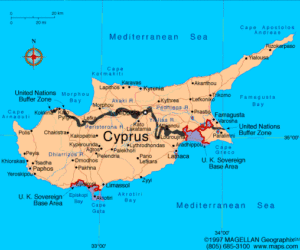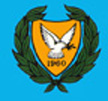Cyprus was a British colony from 1925 to 1959. Cypriots fought alongside the allies against fascism and nazism during World War II. The British, however, refused to keep their word and give the island the right of self determination when the war was over. This was followed by the Enosis referendum of 1950, when 96% of Greek Cypriots voted for Enosis – Union with Greece. From 1955-59 the EOKA Liberation Struggle fought against the colonial master, and resulted in the granting of independence to the island on the basis of the Zurich and London Agreements of February 1959..
In the early 1950s Turkey started to show an interest in Cyprus, through its Turkish minority in Cyprus. It was supported by Britain, which aimed in this way to counter-balance the attempts by the Greeks of Cyprus to gain their freedom and unite with Greece. Despite the creation of the Republic of Cyprus in 1960, Turkey continued with its plans. In 1963 Turkish extremists rebelled against the State and the Turkish Cypriot population retreated into enclaves. On July 20 1974, Turkey invaded Cyprus militarily claiming to the international community that it was undertaking a “peace operation”. As its excuse to invade, it used the Greek Junta coup against Archbishop Makarios. When the UN Security Council intervened, negotiations on the situation began in Geneva among Turkey, Greece, Cyprus and the UK, Turkey tried to impose its views and also gain time for a second military operation. On 14 August 1974, and while the talks in Geneva were still going on, another advance of Turkish troops occurred which resulted in the occupation of 37% of Cyprus. The occupied area is the richest of the island, representing 70% of it’s resources.
 Two hundred thousand Greek Cypriots were forced to abandon their homes and properties. Twenty years after the invasion 1619 people are still missing. Innocent children, women, old people, soldiers and able-bodied men, about whom evidence exists that they were last seen in the hands of the invading forces, have never returned.
Two hundred thousand Greek Cypriots were forced to abandon their homes and properties. Twenty years after the invasion 1619 people are still missing. Innocent children, women, old people, soldiers and able-bodied men, about whom evidence exists that they were last seen in the hands of the invading forces, have never returned.
Later the “Turkish Federated State of Cyprus” was created by Turkey in the occupied part of Cyprus and in 1983, it unilaterally declared itself the “Turkish Republic of Northern Cyprus”. More than 80,000 Turkish settlers have been illegally brought to the island by Turkey and there are approximately 35,000 Turkish troops.
Immediately after the invasion and Turkish occupation, the Government of Cyprus chose to seek a solution by peaceful means, through talks held under the auspices of the UN. To date innumerable such attempts were made, in Vienna, New York, Cyprus and elsewhere. In all the phases of the long but fruitless procedure of intercommunal talks, the Greek Cypriot side has followed a constructive attitude – both in the positions it adopted and the positive proposals it submitted. It has proposed the complete demilitarisation of the island and the securing of international guarantees to meet the security concerns of the whole population of Cyprus. It has also accepted the principle of a federal solution, though the legal, historic, geographic, population, cultural and other factors do not justify such a solution.
The attitude of the Turkish side shows that it does not want a solution but wants the situation created by the invasion and occupation of the northern part of Cyprus, to remain as it is. This conclusion can be reached by the constant procrastination of the Turkish side during the talks, their introduction of new demands each time and their reluctance to achieve even the slightest progress. (see also the UN S.G.’s report, S/1994/629, 30.5.1994)
Moreover, throughout the efforts to find a solution, actions were taken by Turkey contrary to the spirit of the talks, such as the colonisation of the occupied territory, alignment of its economy to that of Turkey, the destruction of Greek, Christian and other monuments and works of art and the declaration of an “independent state”. The Turkish occupation forces have been enforcing a deliberate policy against the cultural heritage of the island and have been attempting to eradicate all testimony to the 9000-year-old Greek Cypriot history.
The United Nations consider the Turkish Army and Turkey responsible for the situation in the island. Several UN resolutions call for a just and lasting solution to the Cyprus question and the implementation of the universal principles and respect for fundamental human rights. The UN Security Council in resolution 541 (1983) considered the declaration of an “independent state” in the areas occupied by the Turkish army as “legally invalid” and called for its withdrawal. Turkey has consistently ignored the international community. The European Committee on Human Rights has found Turkey guilty of mass violations of human rights during and after the invasion and occupation of part of the island. In its reports on three recourses of the Cyprus government against Turkey, the Committee found that ” the acts violating the European Convention of Human Rights were exclusively directed against members of one of the two communities in Cyprus, namely the Greek Cypriot community”.
More than two decades after the Turkish aggression and the de facto division imposed by the Turkish army it has become clear both to the United Nations and to the international community that the present situation is not a solution. On the contrary it has become a source of agony for all, particularly for the Turkish Cypriots, who emigrate en masse. The reunification of Cyprus and the implementation of the universal principles and ideals, namely the UN charter of Human Rights, constitute the best guarantee for a peaceful and lasting future. The people of Cyprus have the right to live in a united and peaceful country.
The political issue, despite efforts to solve it, remains virtually frozen since 1974 and the occupation of Cyprus territory by the Turkish army still continues.
The conflict
It is often said that in every war the first casualty is truth. This is because each of the adversaries systematically hides or distorts the truth in order to advance and justify his own view of the nature and causes of the conflict, and rally support for his actions from his own people and from third parties.
In order to truly understand the disputes between the hostile groups of people (in this case being the Greek and Turkish Cypriots) it is necessary to examine the facts in question under the aspects of ideological beliefs and values of both sides. Of course I must admit that my own outlook is influenced by the fact that I am Greek Cypriot.
In the 1970’s Cyprus had a population of approximately 650,000 which was made up of several ethnic groups. These were (and still are) a Greek Orthodox community (about 80% of the population), a Turkish Moslem community (about 18%), and smaller Maronite, Latin and Armenian minorities.
Some facts: The 1960 constitution
 According to the Constitution, “the state of Cyprus is an independent and sovereign Republic with a presidential regime, the President being Greek and the Vice – President being Turk elected by the Greek and Turkish communities respectively…” (article 1).
According to the Constitution, “the state of Cyprus is an independent and sovereign Republic with a presidential regime, the President being Greek and the Vice – President being Turk elected by the Greek and Turkish communities respectively…” (article 1).
The president was to appoint 7 Greek government ministers and the vice – president 3 government ministers. Of the 50 members of the House of Representatives (the legislative body) 70% were to be Greeks, elected by Greek voters, and 30% Turks, elected by Turkish voters. The president and vice – president had separately and conjointly the power of final veto over legislation, and decisions of the House of Representatives and of the cabinet, on foreign affairs, defence and internal security. Also, all bills imposing duties or taxes required separate simple majorities from the Greek and Turkish Representatives before becoming law.
Another provision of the Constitution was that all government, administrative and state posts, including the police force, were to be apportioned, at all levels, on the principle of 70% for the Greeks and 30% for the Turks. The only exception was the army where the ratio would be 60:40.
Furthermore, the main towns of Cyprus would be split up into Greek and Turkish municipalities, each empowered to raise its own taxes to finance its own public services.
Problems arising from the Constitution
The problem is one of simple mathematics. In 1960 the Greeks made up 80% of the population, and the Turks 18.4% (note that their contribution to public expenditure was only 7.6%). A minority of 18% was given 30% of the House of Representatives and all governmental, administrative and state posts, 40% of the security forces, and a vice – president with veto power!
This Constitution, which had been imposed by foreign powers, was completely unacceptable to the Greek community.
The Constitution of the independent, integral and unitary Republic of Cyprus was, in effect, the Constitution of the Greek-Cypriot – cum – Turkish-Cypriot State.
The two communities were seen as the two sharers of the power, resources and wealth of the State. The republic was split into two states that shared power, instead of the power of a single state being shared through democratic processes to the communities.
Causes of the conflict
Traditionaly at least, 80% of the Cypriots have been very conscious of their Greek language, Greek culture and history, and Greek Orthodox religion; and these things make them NOT Cypriots that just happen to have Greek origins, but Greeks living in Cyprus, and as such members of the larger Greek (Hellenic) nation. Analogously, the 18% have thought of themselves as Turks living in Cyprus, and members of the Turkish nation. Thus, although Andreas and Ali may be natives and residents of Cyprus, and regard the island as their common homeland, they do not normally regard themselves as compatriots, but rather as neighbours.
The Constitution gave to much power to the Turkish minority, and the Government (that is, the Greek Cypriots in the government) decided in 1963 to change the Constitution so as to make it fairer (in proportion to the communities sizes 80:18). The Turkish Cypriots were not willing to give up their power and therefore rebelled.
The solution
The solution is not for each side to give up its national identity, since this is firstly impossible and secondly it would lead to other problems. The solution is forall Cypriots to live in one state with equal human rights, where any person will have the same rights as any other, independently of his nationality.
